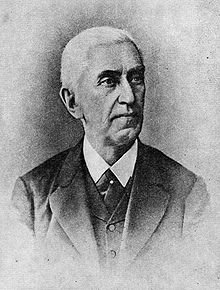- Nikolai Zverev
-
Nikolai Sergeyevich Zverev (Russian: Николай Сергеевич Зверев, sometimes transliterated Nikolai Zveref; 1832 – 12 October [O.S. 30 September] 1893) was a Russian pianist and teacher known for his pupils Alexander Siloti, Sergei Rachmaninoff, Alexander Scriabin, Konstantin Igumnov, Alexander Goldenweiser, and others.[1]
Contents
Life
Zverev was born in 1832 in Volokolamsk, Russia, into an aristocratic family. He attended Moscow State University, studying mathematics and physics, while taking piano lessons from Alexander Dubuque (1812–98).[1] He did not graduate, because he inherited a large family fortune, and moved to Saint Petersburg and became a civil servant.[2] While there, he continued to study piano with Adolf von Henselt, who emphasized the importance of practice, which was the basis of Zverev's own strict regime that he required of his students.[3] Unsatisfied with civil service, and persuaded by Dubuque, he returned to Moscow in 1867 to become a private teacher. In 1870, Nikolai Rubinstein asked him to teach at the Moscow Conservatory, which he did.[1]. Zverev never married, and it has been suggested by scholars such as Faubion Bowers and Max Harrison that he was homosexual and predatory upon the exclusively male students who lodged at his home.[4][5] Zverev died at the age of 61, in 1893.
Teaching methods
Pupils had to audition to become a student of Zverev's. Once accepted, they would move into his house.
Rachmaninoff's recollections are of interest:
I entered Zverev’s home with a heavy heart and foreboding, having heard tell of his severity and ‘heavy hand’, which he had no qualms of resorting to. Indeed, we were able to witness proof of this latter: Zverev had a temper, and could launch himself at a person fists flailing, or hurl some object at the offender. I myself had been the object of his fury on three or four occasions…
But all other talk of his exacting and severe manner were false. This was a man of rare intellect, generosity and kindness. He commanded a great deal of respect among the best people of his time.
Indeed, discipline entered my life. God forbid that I leave the piano five minutes before my time of three hours was up! Or one uncompleted note – such cases were capable of stirring him up into a fearsome temper. However, all our achievements and diligence paid off: he drove us, his pupils, to various houses with concerts. When I finished playing, Zverev said: “Now that is how one should play the piano!”
The impression was that he was quite mad about us, his pupils. He never took a single coin from us as payment: neither for lessons, nor for board (after all, we lived in his house). He dressed us at the best tailors, we never missed a premiere at Moscow theatres – musical or drama. Of course, no really good concert went unnoticed. And that was a time when there was so much on offer: take the famous historical concerts of Anton Rubinstein, where we had an opportunity to hear all that was the greatest!
Zverev never limited himself to bringing us up as pianists. He did his best to generally give us a good all-round upbringing. He was deeply interested in the kind of reading we did.[6]
Zverev required many things of each student, including mandatory opera attendances and chamber music rehearsals.[7] Throughout the week, his students had to practice many hours, but on Sunday, they would relax, and he would host an open house. In the afternoon and evening, he would invite musical and intellectual figures from all over Moscow. His guests included Pyotr Ilyich Tchaikovsky, Alexander Taneyev, Anton Arensky, Anton Rubinstein, Vasily Safonov, Alexander Siloti, and other musicians, actors, lawyers, and professors. During these gatherings, he would allow no one to touch the piano, except to illustrate a point, because it was his students whom the gatherings were for.[1]
Pupils
Zverev took only male students,[5] and referred to them as "cubs" (Russian: зверята),[1] (his own surname is derived from Russian зверь, meaning beast, or animal). The following were among his prominent students:
- Alexander Goldenweiser
- Sergei Rachmaninoff
- Alexander Scriabin
- Alexander Siloti
- Konstantin Igumnov (1873–1948) taught at the Moscow Conservatory, and gave lessons to Natalia Satina, who would become Rachmaninoff's wife.
- Fyodor Keneman (1873–1937) was a friend of Rachmaninoff.
- Leonid Maximof (1873–1904) died at age 29, terminating a successful career.
- Matvei Pressman (1870–1937) became Head of the Rostov Conservatory.
References
- ^ a b c d e Harrison, Max (2006). Rachmaninoff: Life, Works, Recordings. London: Continuum. pp. 11–15. ISBN 0-8264-9312-2. http://books.google.com/books?id=HwSvhu1kLikC.
- ^ Seroff, Victor (1951). Rachmaninoff. London: Orion Publishing Group (Cassell). pp. 13. ISBN 0-8369-8034-4.
- ^ (Portuguese) Gondim, Ricardo (2007-06-12). "The kids who care, Concerto No. 2, Rachmaninoff". Logos Electronico. http://www.logoseletronico.com/audicoes/rach.htm. Retrieved 2007-12-08.
- ^ Bowers, Faubion. "Scriabin Again and Again". UBU Web. http://www.ubu.com/aspen/aspen2/scriabin.html. Retrieved 2007-12-10.
- ^ a b Harrison, p. 22. "The problem was not that Rachmaninoff needed a separate room and piano for his composing. Certainly, while he taught the wives and daughters of his patrons in the many Moscow houses he visited, it was notable that he only took boys—never girls, however gifted—to live with him in his own establishment."
- ^ Davide Polovineo, Review Article "Rachmaninoff.The Beginning.How are Genius Taught?" (Apr 21, 2008 Moscow Time), in Journal of the Istituto Europeo di Musica 1 (2011), pp.12
- ^ Bertensson, Sergei; Jay Leyda (2001). Sergei Rachmaninoff: A Lifetime in Music. Bloomington, Indiana: Indiana University Press. pp. 8–12. ISBN 0-2532-1421-1. http://books.google.com/books?id=KM-dgfOaIIkC.
Categories:- 1832 births
- 1898 deaths
- LGBT musicians
- Russian classical pianists
- Sergei Rachmaninoff
- Russian music educators
Wikimedia Foundation. 2010.


